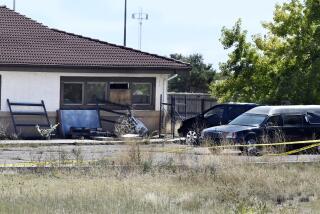Taiwan Takes Aim at Mortuary Mob
- Share via
TAIPEI, Taiwan — As police help haul away a mangled car after a fatal traffic accident, a scuffle breaks out.
It isn’t an argument over which driver is at fault; it’s a fight between gangs from rival mortuaries seeking to take away and bury the crash victim’s body, still lying in a pool of blood.
This scene has become common since gangsters started staking out turf in Taiwan’s lucrative mortuary business. Nicknamed “funeral rascals,” the mobsters make a killing by charging exorbitant prices for everything from a shroud to transporting a body.
The gangsters are employing the intimidation tactics they use in gambling, prostitution and narcotics to muscle out legitimate undertakers. Eight thugs recently broke into a rival funeral parlor in the capital, Taipei, and beat its employees and smashed urns of ashes.
Officials say crooked funeral businesses are also corrupting police by bribing officers for tips about traffic deaths.
“Whoever first gets to toss a shroud over the body gets the business,” says Lin Liang-sheng, an official in the Taipei municipal government, which is trying to crack down on gangsters’ growing influence in the business.
Employees at city-run morgues and graveyards take bribes from funeral parlors, and several have been beaten for demanding bribes considered too high, City Councilman Tuan Yi-kang says.
“It is a deeply intertwined structure of collusion,” Tuan adds.
Funerals are a big business in Taiwan. Predominantly immigrants from mainland China, Taiwanese follow age-old Chinese traditions on honoring gods and ancestors to seek their blessings for peace and fortune.
People hire monks and nuns to chant Buddhist scriptures for weeks to help rest the souls of the deceased. When an auspicious date is picked for the funeral, bands lead processions through the streets in hopes this will guide the spirit to a happier afterlife.
A funeral is also a status symbol. In the countryside, processions try to attract attention with strippers or scantily clad singers. Grieving families will hire people off the street to cry into loudspeakers to make their grief known to neighbors and friends.
At a recent funeral for an influential local politician, Hsiao Teng-wang, bands, honor guards and mourners riding in more than 100 Mercedes-Benz cars made up a nearly 2-mile-long procession that wound through the streets of Chiayi City in southern Taiwan.
The drawn-out, lavish and complex funeral ceremonies create many opportunities to make a buck.
As in most parts of the world, few family members are in a mood to dicker over funeral prices, and haggling can be seen as a lack of respect for the dead. An average funeral thus costs the equivalent of $10,800, or nearly 40% of the average annual household income.
“People don’t cut corners on something that is a once-in-a-lifetime event, and some businesspeople take advantage of this,” says Duan Hung-yi, an executive at Treasure Mountain Funeral Parlor.
But Duan says that there are plenty of honest funeral parlors and that his company even provides free coffins to poor families.
Corruption-busters in the Taipei government fear criminal inroads into the funeral business are getting out of control. Mayor Ma Ying-jeou, a former justice minister, is stepping up regulations--a move that has attracted threats from mobsters.
Chen Jeau-mei, director of the Taipei Bureau of Social Affairs, says she and two aides received an anonymous letter warning that “your bodies shall be dumped in the street in three months.” It came after she banned the display of recycled plastic wreaths at two city-run morgues, a $2.9-million annual business much controlled by the mob.
The city has also organized weekly mass funerals to help families cut costs. The municipal government has also posted on the Internet a list of honest funeral parlors and has begun investigating reports of bribe-taking at morgues.
Chen admits the threats she has received scared her, but she’s not ready to back off.
“Someone has to do this,” she says.
More to Read
Sign up for Essential California
The most important California stories and recommendations in your inbox every morning.
You may occasionally receive promotional content from the Los Angeles Times.













